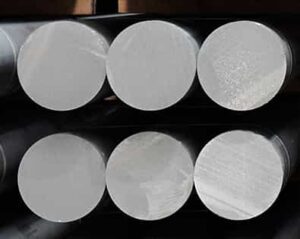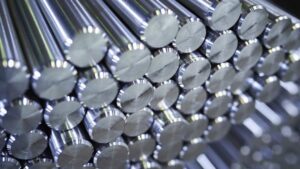Reshaping Industries: Tool Steel‘s Transformative Influence
 Tool steel is the driving force that powers manufacturing. This versatile metal allows us to cut, shape, mold, and fabricate materials with precision and efficiency unattainable with other materials. As industries push to new frontiers, specialty tool steels transform what’s possible.
Tool steel is the driving force that powers manufacturing. This versatile metal allows us to cut, shape, mold, and fabricate materials with precision and efficiency unattainable with other materials. As industries push to new frontiers, specialty tool steels transform what’s possible.
In this article, we’ll explore tool steel’s transformative impact across key sectors like aerospace, medical devices, consumer products, and energy. Discover how tool steels enable stronger jet turbine blades, lifesaving surgical implants, higher definition electronics, and massive oil rig drills. The unique properties of tool steels reshape entire industries.
An Introduction to Transformational Tool Steels
Tool steels refer to the family of carbon and alloy steels purpose-engineered for machining, pressing, molding, casting, and other manufacturing processes. Their specialized properties include:
- Extreme hardness while retaining fracture toughness
- Ability to withstand high force, temperature, and friction
- Excellent wear resistance through millions of cycles
- Dimensional stability across repeated heating/cooling
- High polishability and manufacturability
These attributes allow tool steels to be machined into precision components like cutting tools, molds, dies, and mechanical parts vital to production. No other material combines hardness, strength, stability, and workability in the same way. This one-of-a-kind blend empowers tool steels to reshape how industries design and build products that transform our world.
Revolutionizing Aerospace
Aerospace constantly pushes the limits of design to extract maximum performance from aircraft and spacecraft. Specialty tool steels make many breakthroughs possible.
Stronger Jet Turbines
Aircraft jet engines operate at the extremes of temperature, rotation speed, and stress. Nickel superalloys form turbine blades that withstand searing heat and centrifugal forces. Yet these alloys are notoriously difficult to machine. Tool steels transform the fabricated alloys into finished blades. Tungsten and cobalt tool steel cutting implements bore, drill, turn, and mill the durable nickel components with precision. This machinery simply wouldn’t be possible without tool steels that remain hardened and stable even at high machining temperatures. The resulting blades increase engine efficiency, reducing fuel consumption.
Lighter Components
Aircraft are constantly pressured to become lighter. Tool steels help mold slender titanium and aluminum structures and composite parts that do more with less material. Hot forming dies shape lightweight aluminum fuselage frames and wing stringers. Autoclave tools mold ultra-strong, thin carbon fiber panels for maximum lift at lower weight. Precision cutters mill minimal material away when finishing composite structures. With tool steel technology, aerospace engineers can design groundbreaking vehicles that fly farther and faster on less fuel.
Next Generation Manufacturing
Aerospace’s endless mission to improve performance spurs new manufacturing frontiers.Tool steels will be critical in this evolution. Harder grades and coatings boost cutting speeds and part accuracy. Additive techniques like 3D printed tooling containing complex internal geometries simplify fabrication of components. Embedded sensors transmit real-time tool condition data for predictive maintenance. As aerospace looks toUnlock tool steels hold the key to unlocking next-level production capabilities.
Tool steels give aerospace engineers the keys to keep reaching higher, faster, and with greater efficiency. This metal cuts out limitations to continuously revolutionize what’s possible in the sky and beyond.
Driving Innovation in Automotive
Automotive manufacturing thrives on high efficiency, precision, and maximizing production. Tool steels deliver the performance and durability needed to succeed, shaping the future of mobility.
Powertrain Evolution
Powertrain engineering is undergoing a revolution. Modern gas and diesel engines push efficiency limits with turbocharging, direct injection, and variable valve timing. Electric vehicles demand even greater precision. Efficient motors rely on smooth rotors and stators shaped by durable cutting tools and molds. Long-lasting batteries depend on meticulously built cooling systems and interfaces. Reliable power electronics require specially machined contacts and heat sinks. Tool steel inserts, drills, mills, and dies maintain tight tolerances and surface finishes even under harsh machining conditions. As engines and electric drives evolve, tool steels will be crucial in translating designs into reality.
Lighter, Safer Vehicle Structures
Automakers race to shed weight and add safety with advanced materials. Tool steels help build lighter aluminum and composite bodies with robust crash structures. Fine blanking dies cut ultra-high-strength steel into lightweight, multi-thickness panels. Hydroforming dies shape complex aluminum chassis components from tube stock. Composite molds build carbon fiber tubs strong enough for supercars yet weigh half as much as steel. Automated presses churn out finished body panels at high volumes. With tool steel technology, auto engineers can innovate vehicles that offer efficiency, safety, and affordability.
Precision at Every Scale
Even micro features require precision tooling. Miniscule molds shape plastic connectors and intricate electronics housings with zero flash or warpage. Micro drills add cooling holes to critical combustion components. Nano-smooth finishes improve bearing and seal interfaces. Cutting tools carve foam patterns for sand castings. From drivetrain to interior, tool steels machine automotive pieces of every size with finesse. This empowers engineers to include critical details and textures that improve performance and feel. Nothing else permits automakers to produce miniaturized components on a mass scale. Tool steels drive innovation at both the microscopic and macroscopic levels.
Automotive relies on tool steels to stay competitive. As cars continue improving, specialty tool steels will be behind the wheel driving progress.
Under the Hood in Consumer Electronics
Today’s sleek, compact consumer electronics hide the manufacturing miracles within. Tool steels play an integral role crafting these popular devices.
Strong Yet Sensitive Displays
Modern touchscreens seem like science fiction. Yet tool steels transform these sturdy, sensitive panels from imaginative concepts into tangible products. Diamond cutting wheels divide each sheet with minimal material waste. Super-hard tool steel planing and lapping equipment creates unbreakable glass surfaces with nanometer smoothness for flawless finger gliding. Precision injection molds shape tough polycarbonate layers to protect underlying electronics. And durable chrome molds build the display seamlessly into the device housing. With specialty tooling technology, engineers can now design beautiful devices with massive, damage-resistant touchscreens that were once impractical.
Miniaturized Components
Packing tremendous processing power into ever smaller packages demands engineering magic. Tool steels enable molding and machining micro components critical in modern devices. Injection molds shape intricate buttons, contact pins, and camera modules mere millimeters in size with perfect accuracy. Carbide micro drill bits bore microscopic cooling vents into densely packed circuit boards. Ultra-fine polishing discs create mirror-smooth finishes on miniature lenses for optimal image quality. Without specialized tooling made possible by tool steels, today’s tiny yet powerful electronics would remain a concept trapped on paper.
Streamlined Manufacturing
Consumer electronics strive for continuous cost reductions without sacrificing quality. Tool steels optimize manufacturing to hit cost targets. Dies accurately punch hundreds of miniscule speaker holes per second. Rapid tooling replaces injection molds in days rather than weeks to adjust to design revisions. Durable press tools withstand millions of cycles cranking out aluminum housings with minimal downtime. Capitalizing on tool steel technology allows creating sophisticated electronics rapidly, affordably, and consistently in huge volumes.
In consumer products, tool steels transform cutting-edge concepts into game-changing commercial devices enjoyed worldwide.
Medical Miracles
Medical technology saves lives by restoring health and function. Specialty tool steels help shape therapeutic equipment and implants that improve longevity and quality of life.
Biomedical Implants
Artificial joints, stents, surgical screws, and dental implants require biocompatible metals and plastics shaped precisely to interface with living tissue. Cast and wrought cobalt alloys make ideal implants. Yet these exotic metals are extremely difficult to machine smoothly and cleanly. This is where high performance tool steels shine. They can cut and finish cobalt components without tearing or overheating. Machining remains precise across thousands of parts. The resulting implants integrate seamlessly into the body. Other tool steels injection mold intricate polymer devices and non-stick coatings applied to tools before surgery. Patients enjoy improved mobility and recovery thanks to fabricated implants crafted with tool steel technology.
Surgical Instrumentation
Delicate surgical procedures demand specialized precision instruments. Tool steels enable sharpening, shaping, smoothing, and polishing stainless steels into thin, curved blades, needles, clamps, and retractors with fine control and repeatability across production batches. Stainless grades like 420, 440C, and 17-4PH become lifesaving scalpels, forceps, scissors, and chisels when refined via tool steel machining, grinding, and EDM electrodes. The reliability allows surgeons to focus on their work knowing their tools will perform consistently.
Sterilization and Safety
Reusing surgical tools requires thorough cleaning and sterilization between procedures. Durable tool steel endoscope channels, biopsy forceps, and orthopedic drills withstand constant heat cycles, caustic chemicals, and abrasive sterilization without damage. This ensures contaminants are eliminated so tools are safe for repeated use. Had these devices been constructed from other weaker or corrodible metals, they could fail during reprocessing and risk patient infection. Tool steel’s resilience saves lives.
In healthcare, specialty tool steels support innovations that extend and improve life. From implants to instruments, tool steel empowers medical breakthroughs.
Powering the Energy Industry
 Safe, reliable energy depends on specialty metals tough enough for the job. Tool steels fulfill this crucial role across energy production, distribution, and transportation.
Safe, reliable energy depends on specialty metals tough enough for the job. Tool steels fulfill this crucial role across energy production, distribution, and transportation.
Full-Scale Fabrication
Massive components like offshore oil platform legs, wind turbine nacelles, hydroelectric gates, and nuclear reactor vessels depend on enormous lathes, mills, drills, and thermal cutters to fabricate thick steel. Size demands tool steel equipment. Forged tool steel turning inserts withstand high forces when roughing giant parts from ingots and slabs. Large boring bars must resist deflection when machining precise bearing and fluid interfaces deep within massive parts. Broaches cut huge splines and keyways with exacting fit. Without tools and machinery only possible through tool steels, such colossal energy components couldn’t be produced.
pipes and pipelines
Safely directing oil, gas, steam, and chemicals across continents and oceans requires pipe that is structurally sound and leak-free. Tool steels transform pipeline raw stock into reliable conduits. ID/OD turning tools, facing cutters, and threading dies fashion pipe to dimensional specs consistently through extended runs. Precision rolling dies form exacting curves without wrinkling or weakening as pipelines follow the terrain. Critical branch outlets and valve fittings depend on tool steel boring, trepanning, and machining for leak-proof joints. Only tool steels produce pipeline components with the needed combination of toughness, corrosion resistance, and quality control.
Drilling Innovation
Extracting subterranean resources demands drilling ever longer and deeper holes. Tool steels drive bit and machinery innovations that open access to new reservoirs. Ultra hard drill heads incorporating industrial diamond shear throughdense rock. Durable, heat-resistant steel shafts resist warping. Mud channel inserts withstand abrasive slurry. Equipment surfaces are hard coated for abrasion protection. Components stay sharp and precise despite punishing conditions that would destroy lesser metals. Uncompromising tool steels supply solutions that continuously lengthen the reach and productivity of drilling.
For energy, specialty tool steels power innovations in harvesting resources safely and delivering them across vast distances. This transforms what’s feasible for energy companies.
Key Takeaways on Tool Steel‘s Impact
Tool steels revolutionize manufacturing possibilities across industries:
- Aerospace depends on specialized tooling for superalloy components and composite structures that fly farther with less fuel.
- Automotive innovations in powertrains, lightweighting, and precision detailing are only possible with durable tool steel dies and molds.
- Consumer electronics demand tool steels for machining fragile glass, injection molding micro components, and high speed manufacturing.
- Medical miracles like joint implants and surgical tools rely on biocompatible, precise tool steel machining capabilities.
- Energy industries utilize enormous tool steel boring bars, trepanning cutters, and rolling dies to produce steel components on a massive scale.
No other material possesses the hardness, strength, and versatility required to shape the future. Tool steels will remain indispensable wherever breakthrough manufacturing occurs.
FAQ
How do tool steels influence industrial manufacturing?
Tool steels allow machining, molding, pressing, and cutting exotic, hard, and high-strength materials. This enables industries to manufacture next-generation components using advanced materials that push the limits. Tool steels drive innovation across sectors.
What role do tool steels play in aerospace manufacturing?
Machining nickel superalloys for jet turbine blades requires specialty cutting tools only possible with tool steel alloys. Tool steels also enable precision machining and molding lightweight alloys and composites for improved performance. This transforms aircraft capabilities.
How are tool steels used in the automotive industry?
Automotive depends on tool steel dies, molds, drills, and cutters for machining precision engine components, stamping body panels, die casting drivetrains, and molding plastic parts. Tool steels enable efficient, high-quality mass production.
How do tool steels impact medical device manufacturing?
Machining cobalt chrome alloys for joint implants requires tool steel cutting tools. Molding tiny polymer medical devices and sharpening stainless steel surgical tools also relies on tool steel equipment tailored for biocompatible materials. This revolutionizes patient treatment.
What energy industry applications rely on tool steels?
Oil drilling tools, massive machinery for fabricating heavy steel components, pipe forming dies, and tools for mining all demand specialty tool steels for hardness and durability in large-scale processes. This transforms energy harvesting and infrastructure.

